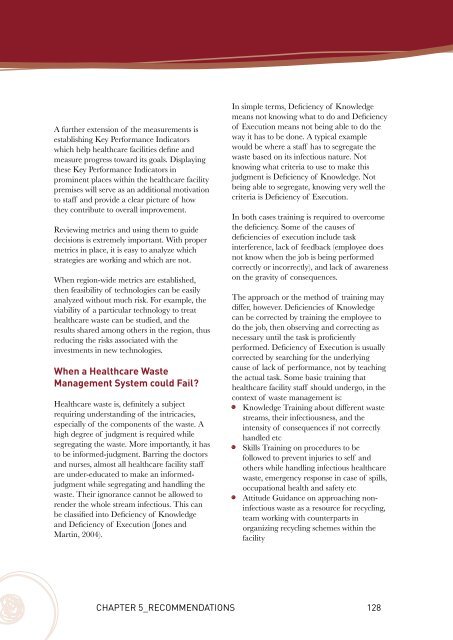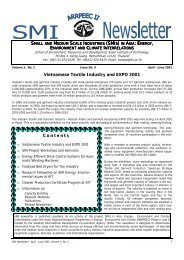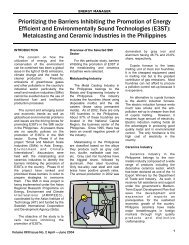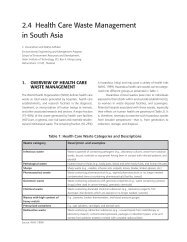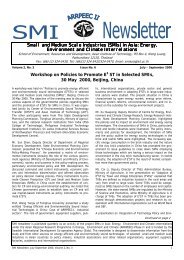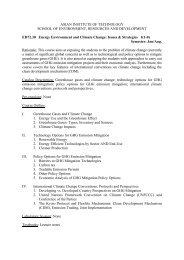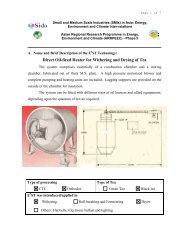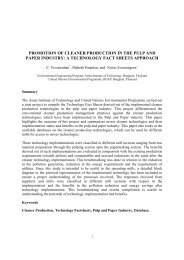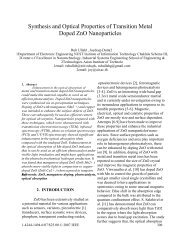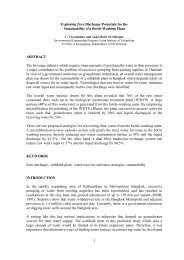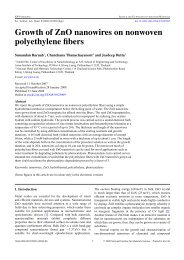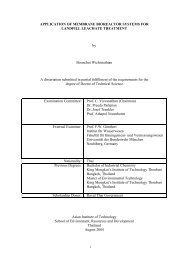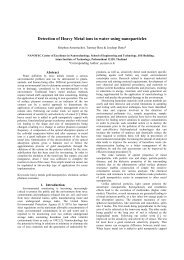Healthcare Waste Report - Environment Health
Healthcare Waste Report - Environment Health
Healthcare Waste Report - Environment Health
You also want an ePaper? Increase the reach of your titles
YUMPU automatically turns print PDFs into web optimized ePapers that Google loves.
A further extension of the measurements is<br />
establishing Key Performance Indicators<br />
which help healthcare facilities define and<br />
measure progress toward its goals. Displaying<br />
these Key Performance Indicators in<br />
prominent places within the healthcare facility<br />
premises will serve as an additional motivation<br />
to staff and provide a clear picture of how<br />
they contribute to overall improvement.<br />
Reviewing metrics and using them to guide<br />
decisions is extremely important. With proper<br />
metrics in place, it is easy to analyze which<br />
strategies are working and which are not.<br />
When region-wide metrics are established,<br />
then feasibility of technologies can be easily<br />
analyzed without much risk. For example, the<br />
viability of a particular technology to treat<br />
healthcare waste can be studied, and the<br />
results shared among others in the region, thus<br />
reducing the risks associated with the<br />
investments in new technologies.<br />
When a <strong><strong>Health</strong>care</strong> <strong>Waste</strong><br />
Management System could Fail?<br />
<strong><strong>Health</strong>care</strong> waste is, definitely a subject<br />
requiring understanding of the intricacies,<br />
especially of the components of the waste. A<br />
high degree of judgment is required while<br />
segregating the waste. More importantly, it has<br />
to be informed-judgment. Barring the doctors<br />
and nurses, almost all healthcare facility staff<br />
are under-educated to make an informedjudgment<br />
while segregating and handling the<br />
waste. Their ignorance cannot be allowed to<br />
render the whole stream infectious. This can<br />
be classified into Deficiency of Knowledge<br />
and Deficiency of Execution (Jones and<br />
Martin, 2004).<br />
CHAPTER 5_RECOMMENDATIONS<br />
In simple terms, Deficiency of Knowledge<br />
means not knowing what to do and Deficiency<br />
of Execution means not being able to do the<br />
way it has to be done. A typical example<br />
would be where a staff has to segregate the<br />
waste based on its infectious nature. Not<br />
knowing what criteria to use to make this<br />
judgment is Deficiency of Knowledge. Not<br />
being able to segregate, knowing very well the<br />
criteria is Deficiency of Execution.<br />
In both cases training is required to overcome<br />
the deficiency. Some of the causes of<br />
deficiencies of execution include task<br />
interference, lack of feedback (employee does<br />
not know when the job is being performed<br />
correctly or incorrectly), and lack of awareness<br />
on the gravity of consequences.<br />
The approach or the method of training may<br />
differ, however. Deficiencies of Knowledge<br />
can be corrected by training the employee to<br />
do the job, then observing and correcting as<br />
necessary until the task is proficiently<br />
performed. Deficiency of Execution is usually<br />
corrected by searching for the underlying<br />
cause of lack of performance, not by teaching<br />
the actual task. Some basic training that<br />
healthcare facility staff should undergo, in the<br />
context of waste management is:<br />
Knowledge Training about different waste<br />
streams, their infectiousness, and the<br />
intensity of consequences if not correctly<br />
handled etc<br />
Skills Training on procedures to be<br />
followed to prevent injuries to self and<br />
others while handling infectious healthcare<br />
waste, emergency response in case of spills,<br />
occupational health and safety etc<br />
Attitude Guidance on approaching noninfectious<br />
waste as a resource for recycling,<br />
team working with counterparts in<br />
organizing recycling schemes within the<br />
facility<br />
128


